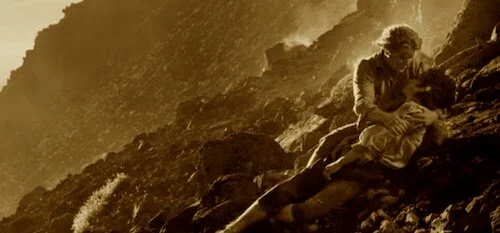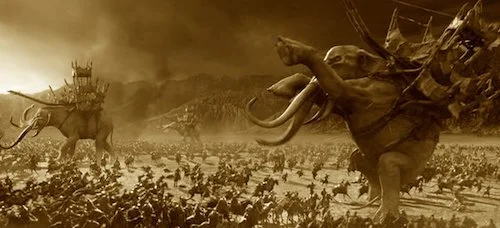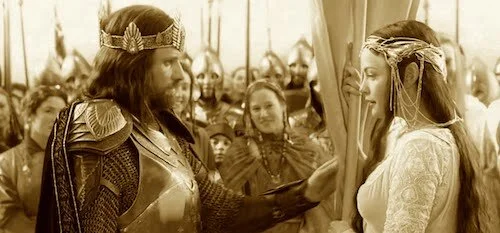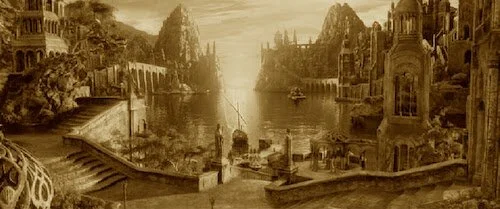The Lord of the Rings: The Return of the King
This review is a part of the Best Picture Project: a review of every single Academy Award winner for the Best Picture category. The Lord of the Rings: The Return of the King is the seventy sixth Best Picture winner at the 2003 Academy Awards.
If there was ever a Best Picture winner that caused many anomalies, it’s The Lord of the Rings: The Return of the King. Here was a fantasy film (the only one to ever win until The Shape of Water), that was the third film in a trilogy (the first sequel to win as a stand-alone winner, and the second sequel to win after The Godfather Part II), and it ties the record for most wins (eleven, with Ben-Hur and Titanic), while setting a record for the biggest clean sweep (it didn’t lose in any category it was considered for). If anything, marking The Return of the King as the final part of a lengthy The Lord of the Rings film means that these wins are a part of the entire trilogy. If that is so, then the entire trilogy has even more wins, making The Lord of the Rings the greatest Academy Awards darling in history. If that’s not a testament to how universal J. R. R. Tolkein’s fantasy writing is, then I don’t know what is.
Part of this success came from the absolutely perfect game plan by a then-unknown Peter Jackson (a grizzly horror director) and a major gamble from New Line Cinema. Since when would a production company entrust a blockbuster newbie with making an entire trilogy, by shooting the films all at once (and, if anything, in reverse order for the most part), and not worry about any of the potential financial or critical drawbacks? Jackson clearly had more than enough creative control, too. I can’t imagine that kind of blind trust nowadays. I know The Lord of the Rings is guaranteed to sell, but that’s still a leap of faith if I’ve ever seen it. You know what? It paid off significantly. The Return of the King is uniform with the previous two instalments (The Fellowship of the Ring, and The Two Towers) in tone, quality, and connectivity. This may be the greatest mainstream blockbuster trilogy of all time.
Despite having lots of action, each moment is still captured artistically, making The Return of the King as moving as it is exhilarating.
The Return of the King begins with a bit of a brief detour: the revisiting of the life of Sméagol when he was still a healthy hobbit. We experience the very second he discovered the One Ring, and he immediately succumbs to its power. The film starts off with a reminder that this entry of the trilogy is all about the decisions one makes when they are in a place of power. Aragorn has every right to fulfil the title of king. Gandalf means to cleanse Middle-earth of evil. You can apply a self fulfilling mission for any remaining member of the Fellowship. With the amount of backstory supplied thus far, we know these characters better than they may know themselves.
So, onward and upward. With the juggling between storylines present, The Return of the King has battles at every turn, but story streamlined through every moment. You aren’t ever stuck at a standstill, waiting for the action to end. There is always something insane happening. In the grand scheme of things, The Return of the King is somewhat of a multi hour climax to the trilogy. It’s a lot to take in, but every single second is glorious. These include the actual war sequences, which remain as breathtaking as they were upon release. Throughout the whole trilogy, there might be a couple of special effects that are a bit strange over fifteen eyers later. For the most part, the creation of this fictional realm and all of its inhabitants is still absolute eye candy to sink into. There are action films now that don’t look remotely as good.
The entire film — particularly the many war sequences — remain as overwhelming as they ever were.
So, we have a number of prophecies to fulfill, mainly Frodo and Sam’s quest to toss the One Ring into the volcano found in Mount Doom (the main plan from the start of the mission in The Fellowship of the Ring’s midway point), and the protection of Minas Tirith. Every plot thread affects another (the clearing of guards by some members of the Fellowship allows other members to pass through, for instance). Considering this film is hours worth of build up to get to this point, there are so many knots in this narrative web that need tending to, so you never know where you stand. Can everything go well? Can everything go badly, either?
With Fellowship establishing the hierarchies of this Middle Earthian society, and Two Towers providing the growth of every scenario, King is the fight to resolve this whole shebang. King succeeds with flying colours. Don’t give me that nonsense about the ending being too long. This is the ending of an incredibly long trilogy (we’re talking well over ten hours, especially with the extended, and even better, editions). Did you also forget how long the opening to Fellowship is? There are so many storylines that need to be wrapped up gracefully here. I have never been on the bandwagon that felt like the ending drags on. Not even close. So many hours need more than ten minutes to finish everything off. If anything, King still cut many parts of the original novel out and was even wise with what would translate well on screen.
The conclusion is a never-ending stream of triumph and glory.
As a stand alone film, The Return of the King may need context (scratch that: a lot of context) to make sense, but chances are you’re already well in the know by the time you have reached this point. Still, it feels as though it has to be watched as a portion of the entire trilogy, especially on the first viewing. This is why I am led to believe that this Best Picture win is a signifier that the entire trilogy is worthy of this title. Think about it. Each entry was nominated for Best Picture, but neither of the previous first two films won. These were in years where they very well could have. This is not like The Godfather where the first film stands alone so well that it can win Best Picture (even then, the Academy was slightly apprehensive, with Cabaret dominating that year, including Best Director). Here, having a dud of a third film would nullify the entire trilogy. This would be a waste of time. Thus, Fellowship and Two Towers were included in the Best Picture discussion, as a symbol that this series was lingering in the back of the minds of Academy members this whole time.
Then we get to King, which presents all of these previous characters you’ve known for many hours (the ones that have survived this far, anyway), and allows them to reign triumphant or succumb to their own weaknesses. Everyone is a part of this reaction, and no one is safe from this. To go back to the long ending, there are two more complicated resolutions at hand: Frodo and Sam. Frodo was the character the most affected by this One Ring, as he bore it around his neck and felt the weight of the world. Sam had to push Frodo, and even do most of the strategizing on his friend’s behalf. In a conclusion where those with destiny become king, tyranny collapses, and the greedy burn through molten lava just for one last chance, what do we do with the two hobbits that can never go back to a normal life? Sam finds comfort and steadiness back at the Shire, but Frodo needed something a little different. He joins Bilbo, his uncle that has endured a similar life (we see the resulting repercussions for Bilbo throughout The Lord of the Rings), onto one final “adventure” in the Undying Lands. Gandalf leads them there, maybe to rewrite their hobbit stories one last time.
The world building in The Return of the King is second-to-none, rivalled only by the previous two The Lord of the Rings films.
Finding a way to end your legacy nobly is something that I feel like we all took for granted with The Return of the King (yes, despite the box office success being a landmark in cinematic history, and the record setting Academy Award wins). All of us for years pushed for that Hobbit adaptation; yours truly signed a petition for Peter Jackson to direct this work back in the mid 2000’s. Eventually, this film became a two parter, which then became a trilogy. Greed won here, with Warner Bros. Pictures seemingly pushing for a repeat of The Lord of the Rings: New Line Cinema sadly stood by here, whereas they handled The Lord of the Rings much better. One book was spread into three films, making each Hobbit film full of padding (including even a cliff hanger for The Desolation of Smaug, which the Rings films were never guilty of). The fun was still there, and the effects were spectacular, but the heart and power was all gone. This was not a tale told by Bilbo. This was a tale told by Sméagol.
If anything, that revisit to the Shire was proof as to how miraculous The Lord of the Rings really is. With the amount of storytelling going on, every onscreen character gets their proper development. The films themselves have each storyline in tandem, with each hero or villain getting exactly as much time as they deserve. I’ve complained about action-heavy battle films before, but boy does The Lord of the Rings rightfully deserve each and every moment. With the amount of narrative here, every single fight is earned. The fights themselves are sensational. With The Hobbit, everything sadly feels like fan service, and a studio needing to milk a franchise dry. It’s a three-part The Godfather Part III to The Lord of the Rings’ The Godfather one and two.The Lord of the Rings is untouchable with what it got away with: three films, perfectly executed, and ending with (what I consider to be) the strongest entry. It’s a rare feat in mainstream cinema that, at this point, seems impossible to duplicate, no matter who you get involved for whichever project.
Andreas Babiolakis has a Masters degree in Film and Photography Preservation and Collections Management from Ryerson University, as well as a Bachelors degree in Cinema Studies from York University. His favourite times of year are the Criterion Collection flash sales and the annual Toronto International Film Festival.









